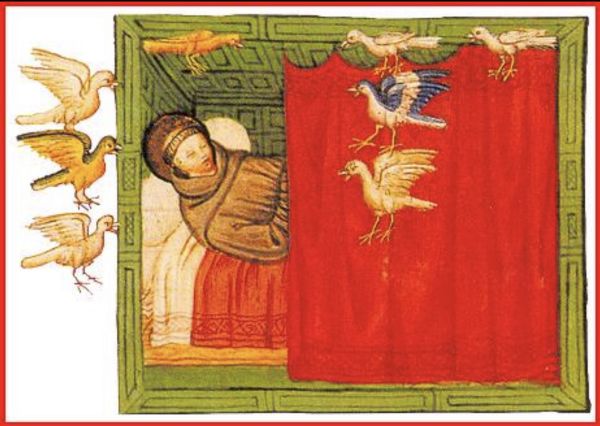St Francis was firmly convinced that it is the Spirit that gives life and makes one reborn, opening up new horizons.
This, while living according to the flesh makes one incapable of understanding the things of God. Indeed, the Sources state:
"Let us brothers beware of all pride and vain glory; and let us guard against the wisdom of this world and the prudence of the flesh.
For the spirit of the flesh desires and cares much for possessing words, but little for putting them into practice, and it seeks not the inward religiosity and holiness of the Spirit, but desires and wishes to have a religiosity and holiness that appears outside to men" (FF 48).
And he continues:
"I, Brother Francis, your smallest servant, beg and implore you, in the charity that is God [...] that these words and the others of the Lord Jesus Christ, with humility and love, you must accept them and put them into practice and observe them. And those who cannot read, let them read them often, and learn them by heart, putting them into holy practice until the end, because they are Spirit and Life" (FF 206).
For Francis the Holy Word, the Living Voice of God was the reason for life, the meaning of it, the guide on the journey.
That same Voice visited him and revealed to him what he had to do to be One with the Gospel.
Truly with the attitude of one who seeks the Word of the Eternal, he listened and passed by the church of San Damiano and entered it.
It was as if he were saying to God: "Lord, to whom can I go, if not to you?"
Francis had understood the importance of following the poor Crucified One, because only from Him flowed the words of eternal life; only Jesus, the Flesh and Life of the world could make him happy.
And in so doing, go after Him not out of convenience, but out of self-giving love for the salvation of the multitudes.
As a true disciple, he realised that the gospel message demands following it without ifs and buts.
The Holy Operation
In chapter six of John's Gospel, Jesus speaking to his disciples affirms that only the Spirit of God can revive man and open him to new horizons.
After a carefree youth, when Francis of Assisi meets the Lord, he receives a great outpouring of the Holy Spirit, which, turning his life upside down, leads him to a completely new existential style, overturned by the Gospel rebirth.
The saint considered himself a fool for Christ, 'simplex et idiot'; united with Our Lady Poverty, because she was assumed by Jesus from the beginning to the end of his life and the source of divine wealth.
By the work of the Spirit he was a new man, before whom bare and vital perspectives prevailed.
The world, with its deceptive physiognomies, no longer interested him and he was attracted solely by unloved Love.
He too, like Peter, if not with words with deeds, had to repeat to our Saviour:
"Jesus to whom shall I go, to whom shall we go! You alone have words that do not pass away!".
But some passages from the Franciscan Sources support all this:
"Another time, being in Rome in the house of a cardinal, he was questioned about some obscure passages, and he expounded those profound concepts with such clarity, that one would think he had always lived in the midst of the Scriptures.
Therefore the lord cardinal said to him:
"I do not question you as a man of letters, but as a man who has the Spirit of God.
And for this reason I gladly accept the meaning of your answer, because I know that it comes from God alone' (FF 691).
And again Celain, in the Vita Prima:
"Men and women, clerics and religious flocked to see and hear the Saint of God, who appeared to all as a man from another world.
People of all ages and sexes were urged to admire the wonders the Lord was again working in the world through his servant.
By reason of the presence or even the mere fame of Saint Francis, it truly seemed as if a new light had been sent at that time from heaven to dispel the caliginous darkness that had invaded the earth" (FF 383).
Francis himself, in the Regola Bollata (1223), exhorts his followers thus:
"What they must desire above all things is to have the Spirit of the Lord and his Holy operation, to pray to him always with a pure heart and to have humility, patience in persecution and infirmity" (FF 104).
"It is the Spirit who vivifies, the flesh is of no avail. The words that I have spoken to you are spirit and are life" (Jn 6:63)












